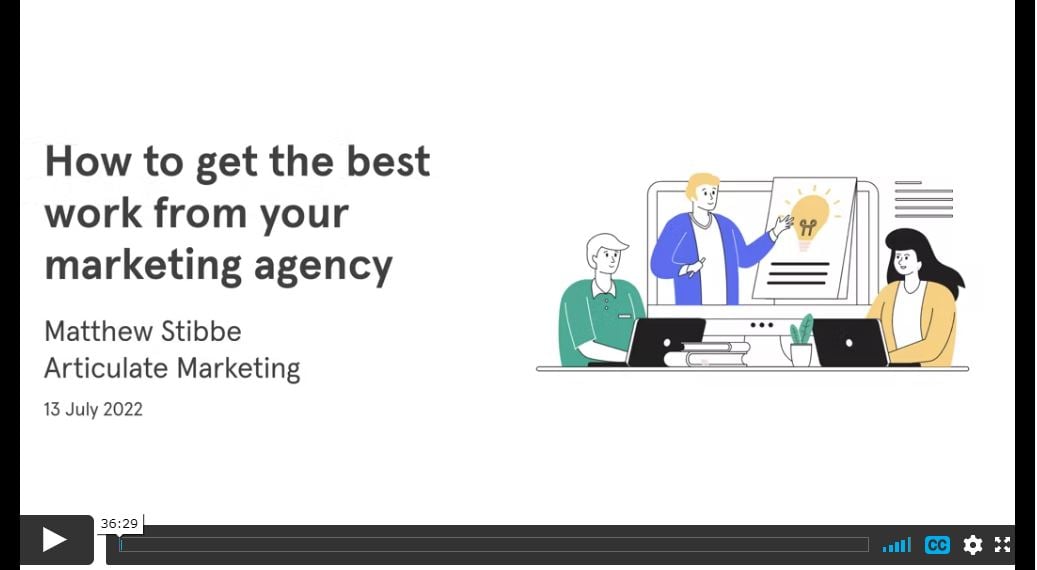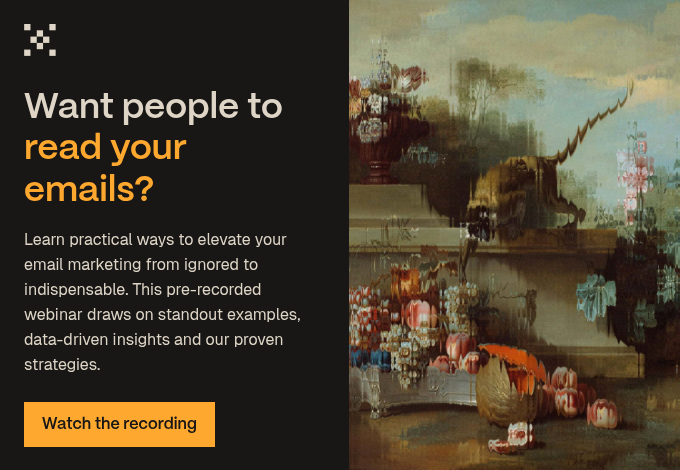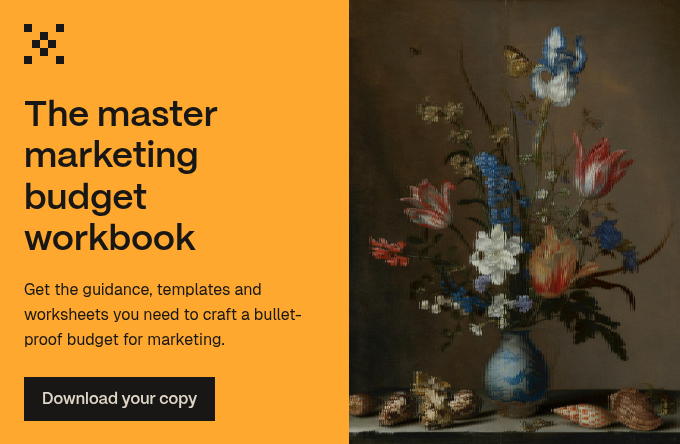Every time we start a new client relationship we say, ‘What is it that you think a good relationship looks like?’
These seven answers come up regularly:
- Good, timely, regular communications
- Expert input
- Understand us
- Clear plan with milestones
- Clear division of labour
- Something we can't do ourselves
- Being proactive
Many of these are also things that we want from you as a client. So let’s explore what you can do to get the best work out of your marketing agency.
This article is based on one of our popular webinars. View the video and download the slides.
 Remember
Remember
From our client charter, there are three points that highlighted what to expect from us and how to be a great client:
- We can't make your decisions for you. It sounds blindingly obvious, but sometimes we work with people and they just will not make a decision about something. They procrastinate. We're doing our bit and we need you to do yours to keep things moving.
- We can’t move faster than you let us. Similarly, if clients delay decisions or don't give us things that we need, we can't move. If you’re the gating item on the critical path, we can't move faster than you will let us.
- We don't know everything that you know. You’re the expert, so you’ll have to communicate with us.
Understanding these fundamental truths about the agency relationship is a good place to start.
Know what you want
Before you pick up the phone and start talking to marketing agencies, it really helps to take a deep forensic look at what the problems are you’re trying to solve.
What are the goals you are trying to achieve? The trivial answer is ‘we want more sales’, or ‘we want more leads’, or ‘we want more website visitors’ — but think deeper.
Marketing fundamentally, is a change project. It's about changing something in the business. That means you're calling us in as experts and as delivery partners to make that change happen.
We’re not fans of a quick 300 words for a homepage, or a single illustration. We value collaboration for a successful marketing change.
Choose the right agency
Then of course, you've got to find the right marketing agency. You want that happy agency relationship, where you are happy and the agency's happy and everything works beautifully. To do this you need to:
- Find a culture and personality fit. Understand what you are like as a company, and perhaps, understand what your expectations are. Are you the Steve Jobs-type aesthetician, who wants to make everything beautiful? Or are you a very technical person, who's very deep into your subject matter knowledge, but maybe doesn't know much about marketing?
- Know thyself. Where are you on your marketing know-how? It might be nil, or it might be you're an expert. You know your business and your industry, but an agency knows marketing.
- Bring just enough industry experience. We often hear prospects saying, "Well, how much work have you done in this particular sub sector of our industry?” We are not coming here to be experts in your business. Marketing has a different function. It’s about bringing just enough industry knowledge to the table for us to get going.
Engage in the sales process
At Articulate, we have quite a consultative sales process. We want to talk to people and understand their needs.
These meetings allow us to describe:
- Who we are
- What we do
- Who we work for
- The problems we solve and how we typically solve them
- How much it typically costs
You as the client need to be able to come to that conversation going, ‘This is who we are. This is what we sell. This is who we sell it to. This is what we’re working with at the moment. These are the problems we’re trying to solve. It's worth this sort of money if you can solve them for us.’
Next, you need to know a little bit about what your marketing goals are.
We can be a completely outsourced marketing department for people.
Equally, we can do one small piece of the marketing activity, such as a HubSpot onboarding, and you might have three other agencies and 20 people in-house working as well. So you just need to know how our work fits into that mix.
Choose the right engagement model
For our work to fit seamlessly with your requirements, you need to know what engagement model is right for you. Examples of engagement models include:
- Project. This is the, ‘We want you to build a new website. We want to pay this much money for it.’ model.
- Consultancy. The consultancy model follows the idea of, ‘We're going to spend some time together and we're going to try and resolve some questions or deliver some outcomes from that.’ It can sometimes be a fixed cost, but it's typically based on an hourly rate.
- Retainer. A retainer model could follow the lines of, ‘We need eight blog posts a month for the next year to accelerate our thought leadership and SEO, how much is that going to cost us?’ It can be a very prescriptive engagement, with a fixed price every month.
- On demand. Finally, on demand is the one that we tend to avoid. It’s the, ‘Oh, can you just do a blog post,’ or, ‘We need a graphic. We need a thing...’ At Articulate, we’re not particularly geared up for random ad hocs. We prefer longer projects with bigger results.
Respect the scope
Understanding the scope and the cost of doing things is really important.
There's a little bit of respect in the sales process. You can’t just ask for one thing to see if you like it before you commit. You don't go to a doctor and go, ‘Ah, can you just cure this disease? If I like it, I'll come back to you for the next one.’
Respecting the scope involves:
- Not asking for free pitching. Evaluating an agency based on how much free work you can get isn’t the best way. Similarly, if you're working on a fixed-price project, it's not reasonable to expect the agency to drop everything and do something that's not in scope.
- Know what you’re getting. No agency is going to give you an all you can eat buffet for a fixed price. So whether you’re just billing for the hours like a lawyer, or whether you are doing fixed price, either we have to control the scope or you have to accept a variable cost.
- Respect the process. Occasionally, a client will sign up for one set of services and then almost immediately pivot to need other things. That needs a little bit of management. A good agency will be responsive to that, but it doesn't mean once you've signed them, you can just ask for anything. You have to engage in that rescoping.
Be mindful of ‘can you just’ requests
Then there's this strange parallel universe of the ‘can you just’ request.
These kind of requests might result in somebody spending an hour out of our contingency budget on your website, or going through each page and suggesting line edits and rewrites which might actually be four or five days of work.
Fixed-price projects
We do quite a lot of work to define the scope. It's incumbent on you to pay attention to it so that when you ask for something else, you understand that it might change the scope.
A typical example of this might be a website, where we agree to do a set number of pages. Then, halfway through you say, ‘Actually, we need 10 more pages about product.’ That’s fine, we’ll add it to the scope.
What’s important though is that two way conversation - you asking, us proposing and documenting it. That bit is incumbent on us to manage correctly.
Communicate well
If you end up doing all of your communication with a client on Slack or email, it gets a little worrying. So, keep up the communication and turn up for meetings.
We have rules of the road for giving revisions and feedback. Understanding how everything works on your end helps us immensely.
In the end, be nice. We want constructive feedback, but it doesn't do very well if it's delivered aggressively or rudely. Some clients think that because they're giving feedback in a document, they can get quite angry or sarcastic. And that's not a not a great look. If you're nice and give constructive feedback that helps us do a better job.
Here’s how you can be a great communicator with your agency:
1. Be awesome at feedback
You can get great work by being awesome at feedback.
Positive feedback is immensely motivating and valuable to creative people. You will get a lot more of what you praise. You don't have to go over the top, but a little bit of positive and constructive feedback is going to be a real help.
Just remember that there are human beings on the other end.
2. Speak up
If there is a problem, speak up. Don't sit there festering in silence until six months down the line.
We can probably solve anything that you're going to talk to us about. We've probably heard it before and we may have a really, really good answer.
3. Think ahead
Make timely decisions. In our experience, delays are often caused by the client, but responsibility for delivering projects on time lies with us. You see the dilemma. We're sitting there waiting for a client to send us something, do something, give feedback on something, approve something…
We'll happily sit and wait for you, providing you don't then turn around and go, ‘Well, the website's a month and a half late.’
We’re not magicians and we don't have a time machine. In fact, the front page of our website says, ‘Anything is possible except love and time machines,’ for this exact reason.
4. Manage POC changes
Point of Contact changes are a critical moment in a relationship with an existing client.
A new marketing contact hasn't gone through the harmonisation, the strategy foundations, onboarding and sales process. They have no emotional commitment to the relationship or understanding of it.
For us, it's a big red flag moment, and we do things on our side to manage that relationship. We try to treat new POCs as if they were new clients and show them how we work.
We understand that people come and go. Business is business. But it needs to be handled.
5. Work with your client partners
We have three client partners in the agency, Paul, Phillip and Helena. They are our diplomats and ambassadors. Their job is to represent Articulate to our clients. But they're also here to represent the client and coordinate resources so we can deliver.
A really important part of your job as a client is to get to know them and not treat them as minions and order takers, but use them constructively to understand how we work.
Happy agencies, happy clients
From our years of experience in the agency game, we’ve found that clients that show these behaviours will have long-lasting, happy relationships with their marketing partners.
Looking to start a beautiful friendship like that? Book a meeting with us today to talk over your goals, build some plans and make it happen.






.jpg?width=400&height=250&name=art-institute-of-chicago-wasoFWW8G1c-unsplash%20(1).jpg)